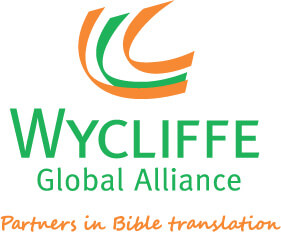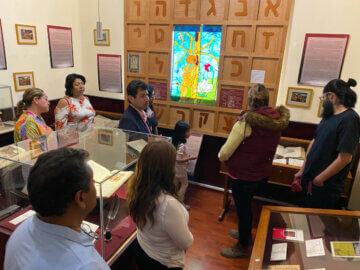A New Name
 Wycliffe International has a new name, Wycliffe Global Alliance. This new “doing business as”* name, effective February 1, 2011, reflects organizational changes already underway and helps position Wycliffe for ongoing adaptability. An accompanying tagline/cutline, partners in Bible translation, serves as a reminder of Wycliffe’s unchanging focus on the minority language communities of the world who still need God’s Word in their “heart” languages. It clearly indicates the purpose of this Alliance.
Wycliffe International has a new name, Wycliffe Global Alliance. This new “doing business as”* name, effective February 1, 2011, reflects organizational changes already underway and helps position Wycliffe for ongoing adaptability. An accompanying tagline/cutline, partners in Bible translation, serves as a reminder of Wycliffe’s unchanging focus on the minority language communities of the world who still need God’s Word in their “heart” languages. It clearly indicates the purpose of this Alliance.
As the worldwide Church and the awareness of the need for translated Scripture grow, so do the opportunities for more and more people to take part in this critical facet of God’s mission. The Wycliffe Global Alliance is helping create an environment for greater and broader participation. The new name reflects changes in structure, but also represents far more.
A New Name to Reflect a New Reality
When Wycliffe Bible Translators International (Wycliffe International) was conceived in 1980, the name was chosen to distinguish this Wycliffe “umbrella” organization from the numerous (now 40+) independent Wycliffe member organizations worldwide that were served by Wycliffe International. At that time, and until 2009, Wycliffe International’s office and administration was located in the USA in Dallas, Texas.
During 2009-2010, Wycliffe International’s office was relocated to Singapore. At that time, Wycliffe International’s Global Leadership Team began referring to Wycliffe International and all it represented as being “in a global alliance.” In November 2010, Executive Director Kirk Franklin brought the issue of a name change to the Wycliffe International Board, stating that the Wycliffe International name no longer reflected who and what the organization had become. He gave the following reasons:
1) The word international in a mission organization’s name (and in the wider business world) usually means a US or UK agency that has offices and/or operates outside of the “home country” but whose operations are still primarily “Western” run or based. Wycliffe International’s primary office was, however, now in Singapore and the 15-person leadership team, originating from 10 nations, was spread across the globe.
2) Wycliffe International had grown to become an alliance of 105+ organizations. Forty-five carry the Wycliffe name in some way because of Wycliffe’s role in their beginnings. Most of the other 60+ organizations began as a result of local or national mission movements. These partner organizations adopted “Wycliffe’s” vision and have a wide range of agreements of cooperation and partnership with Wycliffe.
The Board quickly agreed that ‘Wycliffe Global Alliance' was a more appropriate name. The name was officially registered as the “doing business as” name and official use will begin 1 February.
*the legal name remains Wycliffe Bible Translators International, but the new “doing business as” name Wycliffe Global Alliance is officially registered as well.
Motivation for Change
As stated above, it’s not just about a name change. In 2006, at a Global Leaders Meeting, leaders of Wycliffe Member Organizations provided ideas and discussed how Wycliffe International’s structure could change to better serve the member and partner organizations. The current leadership took this into account and also sought to discern how Wycliffe could best participate in the missio Dei (mission of God) and how Wycliffe could serve in effective partnerships. The leadership recognized the following realities:
- Rapidly changing social, political, cultural, economic and religious environments. Each aspect of this environment presents both opportunities and challenges. Each also has implications for and impact on the linguistic environments.
- Global missiological thinking is growing and provides new perspectives that Wycliffe needs to pay attention to and be a part of.
- Globalization trends around the world and local responses to those trends can and do have an impact on how we think and act.
- The Church worldwide is changing and diverse. These realities impact the Church’s attitudes, strategies and involvement in mission.
- The growth of the Church and of theological reflection and development in Africa, Asia, and the Americas needs to be a part of Wycliffe’s thinking.
- The holistic development of people and communities must be a part of Wycliffe’s thinking and actions. This includes the need to address world issues such as spiritual hunger, quality education, extreme poverty, injustice, improved health services, sustainable environments and creation stewardship, clean drinking water, reduction of infant-child mortality and the prevention of the spread of HIV/AIDS, malaria and other diseases.
Recognizing these realities, the leadership team has positioned Wycliffe for a shift in emphasis and perspective in the following areas:
Theological
- Proclamation → Integral Mission (proclamation and demonstration)
- Local → Glocal (both global and local) Church
Missiological
- Western/Northern Church → Global Church
- Task Partnerships → Kingdom Partnerships
- High Power & Control → Shared Power & Control
Wycliffe Global Alliance Structure and Strategies
- A ‘Building’ → A ‘Journey’
- Individual Members → Organizations & Movements
- Western/Northern → Global
- Hierarchical Partnership Structure → Participatory Partnership Structure
The ability to shift perspectives in these areas would more closely align the Wycliffe Global Alliance with how God is working in and through His worldwide Church in the 21st century. It would also enable the Wycliffe Global Alliance to more effectively address its Board Goals.
Why Wycliffe Global Alliance? What Do the Words Mean?
Wycliffe—input from stakeholders across most of the world emphasized the value of the Wycliffe name and reputation and the, often instant, association with Bible translation and minority language communities. The Wycliffe name is a resource worth retaining.
Global—pertaining to the entire earth; not limited or provincial in scope. Transcending national borders, emphasizing commonality.
Alliance— an agreement (usually formal) between two or more parties, made in order to advance common goals and secure common interests.
The latest
View all articles
Informing, teaching, inspiring: PNG workshop teaches video storytelling for language communities
PNG workshop teaches video storytelling for language communities
Read more
Looking ahead at 2024
As the year unfolds, we marvel at the work of God in our rapidly changing world. And, we look forward to a number of gatherings and conversations intended to draw us together.
Read more
Telling the Bible's Story
It may come as a surprise that a museum is among the Wycliffe Global Alliance organisations.
Read more